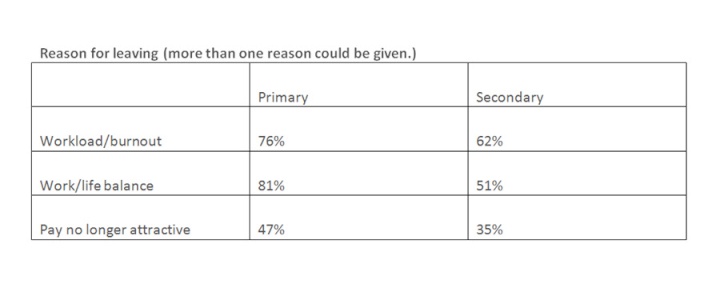Why we are quitting: teachers reveal all

NZEI surveys of teachers and principals who quit the profession last year show they left mainly due to a lack of work/life balance and burnout from high workload.
The survey respondents included 169 primary and 201 secondary teachers and principals.
Pay was a lesser but still significant issue. Many leaving teachers were intending to move to non-teaching jobs, a few were moving overseas to teach and a significant number were leaving the profession without knowing what their next move would be.
Click here to read the survey report online.
Sadly for the profession, fewer than 10 percent intended to return to teaching.
Former Bunnythorpe primary school principal Margie Sutherland said: “It is definitely the workload. I heard from a group of secondary teachers at a wedding in the weekend and they were saying the same thing. It is not all about the money. For older teachers like me, its about making the job realistic.”
NZEI Te Riu Roa President Lynda Stuart said New Zealand was losing passionate, quality teachers because they were overworked and underpaid and simply could not put up with the situation any longer.
“This survey shows why teachers and principals have been so resolute in rejecting the Ministry’s collective agreement offers so far.”
“We have a choice as a country – to pay teachers and principals properly and give them more time to teach and lead, or watch the teacher shortage increase exponentially.”
“Students’ education is already suffering from growing class sizes and classes being split around the school when relievers can’t be found. We have to address this crisis NOW and give current teachers a reason to stay or return, and potential teachers a reason to join us,” she said.
PPTA President Jack Boyle says, “Nearly half of all new teachers leave the profession within five years. Watching the spark go out in an awesome young teacher’s eyes is heart-breaking. We’ve known the statistics for a long time, but reading peoples’ stories in this survey really shows the human anguish behind the numbers.”
“I am convinced that if we make teaching the desirable profession it should be; if we reduce unnecessary red-tape and box-ticking; if we prioritise time to teach; and if we put in place the proper support for new teachers, the crisis level shortages we are experiencing would disappear.”
“People don’t leave the job they love when they are supported well and remunerated properly. It is up to the government to do the right thing now. Let’s recruit our own experienced teachers back.”
*NZEI Te Riu Roa and PPTA contacted the 433 primary and all secondary teacher and principal members who resigned from their job and the union in 2018. Those who had permanently left teaching were invited to take the online survey, with 169 primary and 201 secondary taking part.

What secondary teachers leaving the profession said:
“At the end of my first two years in teaching, I have come to the decision that the expectations on me as a teacher are simply too high for what I get in return. The workload is far too large and the hours given to complete it too few, which has led to increasing stress in all areas of my life. I enjoyed teaching and will miss the students, but it is no longer a viable career for me because of the huge toll it has taken on my wellbeing.”
“If work conditions improve I would like to return one day. I find teaching a joy but the workload strained my mental and physical health greatly over the past few years. If I was older I would stay and build a career but as I’m young enough to leave (and maybe return one day), I’m going to take the chance while I still can.”
“Far too much teaching for assessment rather than for learning and critical thinking. Endless administration, pointless meetings and increasingly unreasonable expectations of extracurricular cover.”
“Having worked at senior mgmt level and come back to a full teaching load I have come to realise that the working conditions of teachers today is just not sustainable. It is not just a matter of pay but the acceptance by the ministry that if teachers today are now expected to track and shift achievement levels of all their students there is simply not enough hours in the day. A full teacher load needs to be reduced to sixteen hours so that the educational goals of New Zealand can realistically be achieved by the amazing people who teach. I do not mind paper work, I even think that teacher inquiries are worth the effort and time they take; but for goodness sake give us the time to do our jobs properly. I have never seen teacher burn out as rife as it is today and the current teacher shortage is a major problem that is in part caused by great teachers leaving the profession simply so they can have time out to recover the burn out. This is just not acceptable and something must be done immediately to ensure that great teachers do not leave the profession.”
“Part-time is not financially attractive due to only being paid for your contact hours and a % loading (which doesn’t cover the many hours spent in a mentoring capacity). I personally found it hard to be part-time with requirements of before and after school meetings (which make it difficult to also be there for my family).”
“As a part-time teacher, I found the expectations for attendance at meetings and additional duties, coupled with perceptions of my workload (i.e. if I wasn’t seen to be working on school premises, then I was “not pulling my weight”) were not fair or reasonable. In addition, poor communication, lack of consultation and lack of genuine appreciation from the senior leaders at my school made a demanding job even harder. I feel my goodwill has been abused and taken for granted, time and time again. I’m sad to leave my students. Working with them was the best part of my day, every day.”
“I am supportive of changes to the way we teach and new initiatives but the quantity of these and time pressure put on staff in which to change within was crippling. This combined with a lack of backing from SLT and a disconnect between the people making the decisions and the people actually implementing them was too much to manage. This led to stress and a low feeling of self-worth that I was never doing enough which was impacting my health (mental and physical). A job is not worth this.”
“Over recent years I have noticed i) increased workload in general ii) workload shifted from NZQA down to teacher level – this is only going to get worse with digital assessment, iii) erosion of work life balance eg moderation meetings now on line seminars in your own time, expectation to complete tasks on line in own time iv) poorer pay differentials with non-teaching occupations.”
“Physically and emotionally “burned out”. Need to re-energise before making further plans.”
What primary teachers leaving the profession said:
“I taught for 15 years in Melbourne. Returning to nz I was appalled by the lack of funding, class sizes, workload, troublesome parents, number of meetings etc. I don’t miss teaching at all. I love my new job and am making less money but my lifestyle and work experience is so much more rewarding and less stressful. Teaching in NZ is not something I would encourage anyone to undertake. I love working with children.”
“I miss the kids immensely but the impact upon my life of the problems with teaching made it impossible for me to continue.”
“Love the kids, hate the structure of the profession. The stress and workload was taxing on my wellbeing.”
“My husband and I are both teachers. We enjoy what we do but teaching in New Zealand took a toll on our personal lives (poor work/life balance due to huge work loads). We are young and missed having a ‘life’. We also want to start a family but there is no way we could comfortably raise a family on our wages.. unfortunately we had friends in similar positions who also had to give up teaching. We have headed overseas to earn more income and to teach with better work conditions. So far it has been amazing! We are unsure whether we will return to teaching in NZ unless there are significant changes.”
“I love teaching, I love my students. I think I am very good at it. But it’s just too much. It has to be your entire life, and I am no longer prepared to give that much while sacrificing my, and my family’s, wellbeing.”
“I am still employed in Australia, but have returned to NZ for family reasons. My pay there as a senior experienced teacher is 101k. Here I got 59k. There I had minimum of 2 hours no contact per week. A maximum of one hour a week meetings in my own time. Here one hour non contact, six hours of meetings in my own time. The treatment of teachers here is disgraceful. They are not valued and the work load is impossible. The support for children with special needs is lacking and the teachers are exhausted and their teaching day is lost when a learning assistant is absent as the needs of one child is attended to. I would rather be poor than put up with these conditions.”
“I work on average 65-70 hours a week during term time and at least 50% of every school holidays too. The work load combined with daily behaviour management issues in the classroom make stress levels too high and staying in my job unattractive. In fact, my teaching job is making me very unwell both physically and mentally.”
“When I started teaching [over 15 years ago], we spent about 70% of our time working with children. The growth in paperwork, statistical exercises and professional documentation has reduced this percentage to less than 50%. Until this is addressed, and technology used to lessen workload, rather than come up with more ways to waste teachers’ time, you won’t see me back in the classroom. I gave up full-time teaching 2 years ago when it became apparent that my own children’s needs were not being met as I was so overloaded with my leadership position. I’ve wanted to be a teacher since I was 3 years old. It saddens me that I can no longer sustain the career I love and maintain a healthy work-life balance. Actually, it makes me really angry.”
“Teaching intermediate involved longer hours and lower pay. No amount of money could convince me to return.”










Teaching was a great profession for me to join. I have taught using increasing technology and was a pioneer for digital learning among my peers. 3 different principals have had three different attitudes towards my approach – both publicly and NOT – The first – I was too soft and should have been harder on the kids – queued them up military style, inspected their uniform etc. Never had a kind word to say about me. The second – was very helpful and pulled the rest of the teachers along to get them to even use Google Docs etc or work collaboratively. The next sees me as a bully. How dare I even get the kids to line up? We are all to teach this way – not that way. I am suddenly old fashioned and yet, I have the most digital of all the classes here. I am older now, and, well, the younger teachers have more of a handle on technology in his eyes. I have not yet been observed by any of them. If I do get observed by one, I am sure that when I am it will involve looking for what I do badly and not what I am doing well. There is no praise in appraisal. The only reason I am a good teacher is because I believe in myself and the results my students have. Yes, I do all of the sports and cultural activities – all of the rest of it. Do I feel acknowledged in any way. No, I don’t. I just keep teaching, smiling and working for peanuts.